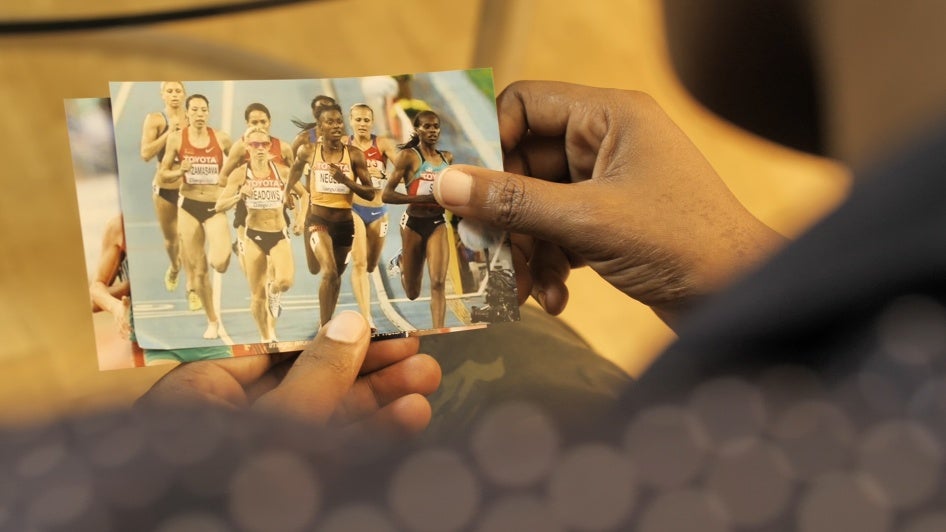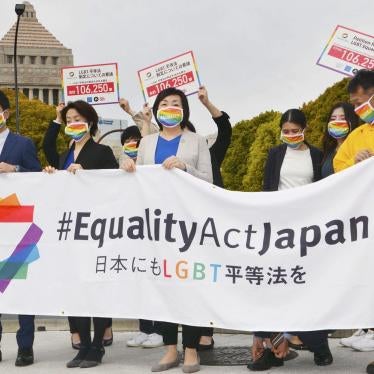(New York) – A new framework published by the International Olympic Committee (IOC) promotes inclusion in sport, Human Rights Watch said today. The new policy contrasts with the “sex testing” policies imposed on some athletes in international track and field competitions.
“The new IOC framework represents a turning point for the fundamental rights of athletes, and a boost for women’s inclusion in sports worldwide,” said Minky Worden, director of global initiatives at Human Rights Watch. “Foregrounding the rights to bodily autonomy, health, and privacy, the IOC has taken a significant step toward protecting the dignity of all women athletes.”
The “IOC Framework on Fairness, Inclusion, and Non-Discrimination on the Basis of Gender Identity and Sex Variations” is the outcome of a years-long process, including consultations with affected athletes, undertaken by the apex body in global sport. The intention is to provide guidelines for sporting federations on how to protect the rights of transgender athletes as well as athletes born with variations of their sex characteristics. The framework replaces the IOC’s 2015 Consensus Statement on the issue of athlete eligibility with regard to gender identity and sex characteristics.
The new IOC framework defers to individual sporting federations to develop eligibility criteria and regulations for their respective sports. But it provides strong human rights-guidance that all sport governing bodies should follow in conjunction with their responsibilities under the 2011 UN Guiding Principles on Business and Human Rights, and the 2019 report of the UN Working Group on Business and Human Rights on the “Gender dimensions of the Guiding Principles on Business and Human Rights.”
Critically, the IOC’s new framework counters many of the harmful elements in the World Athletics “sex testing” regulations that have been recognized, including by the Office of the United Nations High Commissioner for Human Rights, as contributing to a cascade of human rights violations against athletes with variations in their sex characteristics. In a 2020 report, Human Rights Watch documented that World Athletics regulations encourage discrimination, surveillance, and coerced medical intervention on women track and field athletes, which result in physical and psychological injury and economic hardship.
For decades, sport governing bodies have regulated women’s participation in sport through “sex testing” regulations that target women athletes with some variations in their sex characteristics that cause their natural testosterone levels to be higher than typical. The current World Athletics regulations deny these women the right to participate as women for running events between 400 meters and 1 mile, unless they submit to invasive testing and medically unnecessary procedures. These practices – which were used to exclude female athletes such as Caster Semenya from athletic events at the recent Tokyo Olympics – violate fundamental rights to privacy, health, and non-discrimination, Human Rights Watch said.
To identify those covered by the regulations, officials subject all women athletes’ bodies to public scrutiny, and require those who seem “suspect” to undergo degrading and often invasive medical examinations. They amount to policing women’s bodies based on arbitrary definitions of femininity and racial stereotypes. There is no scientific consensus that women with naturally higher testosterone have a performance advantage in athletics. Despite a wide range of testosterone levels among men, there have never been analogous regulations.
In addition to the human rights violations inherent in the regulations, the impact of their enforcement extends beyond sport. Success in athletics can deliver economic stability for women. From scholarships to housing and food, the benefits can come early and may also lead to stable employment outside of sport.
Many affected athletes Human Rights Watch interviewed grew up in abject poverty. Their success in athletics often became a source of livelihood for their extended families. In some cases, their abrupt departure from sport after being disqualified devastated their and their families’ economic well-being.
“My dream at first was taken away from me,” said Annet Negesa, a Ugandan top distance runner who was harmed by a coerced medical intervention. “All of us we are human beings, and we are females.”
Health experts, human rights advocates, and elite athletes have increasingly spoken out against the World Athletics sex testing regulations. In a 2020 report, the Office of the United Nations High Commissioner for Human Rights recommended immediately revoking sex testing regulations for women athletes. The World Medical Association has recommended that physicians around the world should not observe the regulations as they violate medical ethics.
The new IOC fairness and non-discrimination framework states that:
- Sports organizations should identify and prevent negative direct and indirect impacts on athletes’ health and well-being that may come from the design, implementation, and/or interpretation of eligibility criteria.
- Criteria to determine disproportionate competitive advantage may, at times, require testing an athlete’s performance and physical capacity. However, no athlete should be subject to targeted testing of, or aimed at determining, their sex, gender identity, and/or sex variations.
- No athlete should be precluded from competing or excluded from competition on the exclusive ground of an unverified, alleged, or perceived unfair competitive advantage due to their sex variations, physical appearance, and/or transgender status.
- Any restrictions arising from eligibility criteria should be based on robust and peer reviewed research.
- Athletes should never be pressured by an international federation, sports organization, or any other party – either by way of the eligibility criteria or otherwise – to undergo medically unnecessary procedures or treatment to meet eligibility criteria.
- Criteria to determine eligibility for a gender category should not include gynecological examinations or similar forms of invasive physical examinations, aimed at determining an athlete’s sex, sex variations, or gender.
- Medical information about an athlete, including testosterone levels, that is collected in the context of anti-doping or otherwise, must be handled in compliance with applicable privacy laws and should be used only for the purposes disclosed to the athlete at the time such information is collected.
- Sports organizations should avoid public disclosure of athletes’ confidential health and other personal information in the absence of the athletes’ consent.
- Eligibility criteria should be subject to predictable periodic review to reflect any relevant ethical, human rights, legal, scientific, and medical developments in this area and should include the affected stakeholder’s feedback on their application.
The principles outlined in the IOC’s fairness and non-discrimination framework align with the human rights protections in the Olympic Charter, including Principle 4, which states that “every individual must have the possibility of practising sport, without discrimination of any kind,” and Principle 6, which states that, “The enjoyment of the rights and freedoms set forth in this Olympic Charter shall be secured without discrimination of any kind, such as race, colour, sex, sexual orientation, language, religion, political or other opinion, national or social origin, property, birth or other status.”
“The IOC has clarified that while regulating fair play is a valid undertaking for sport authorities, committing human rights violations in the process is not,” Worden said. “Policies that are inherently discriminatory – such as sex testing regulations – fly in the face of the Olympic movement’s commitments to dignity and equality for all, and the new IOC framework makes it clear that sex testing should be relegated to sport’s history books.”








